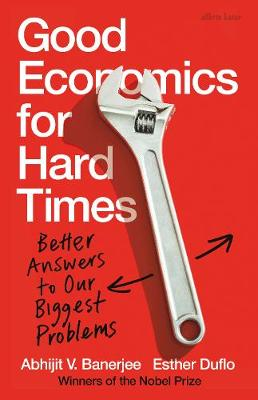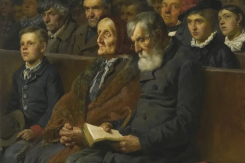Book: Good Economics for Hard Times

Good Economics for Hard Times by Abhijit Banerjee and Esther Duflo, Allen Lane, £25
Since Brexit and the election of Donald Trump, some families have struggled to avoid rows breaking out during the holiday season. This year's Nobel prize-winning economists, Esther Duflo and Abhijit Banerjee, have thoughtfully provided us with the facts required to contradict your cousin Gary when he says "immigrants are taking all our jobs," or asylum seekers come here "to scrounge off benefits."
Banerjee and Duflo examine the thorny issues of mass migration, globalisation, climate disruption and the threat of automation, using a wealth of data from randomised control tests conducted around the world. They reach surprisingly cheerful conclusions about our capacity to solve these problems, if only we learn from successful interventions.
All the research shows that immigrants do not drive down wages: they stimulate economic demand locally and slow down mechanisation by being prepared to do unappealing work. Native born workers actually benefit when they are promoted to more managerial roles to supervise the influx of immigrants.
Nor is it the case that everyone in the poor world is waiting to emigrate to Europe and North America. Many people are motivated by the desire to escape conflict and persecution at home, rather than the search for wealth. Research shows that most of us would prefer to stay home where our world is familiar, rather than taking a leap into the unknown.
In India, people are reluctant to leave the village to head for India's cities, even when given the travel fare to do so, and even when they know their income will increase. They value the support of family and friends in the village, and they do not want to lose their claim on a share of the family's land. Nor do they relish living in a slum and breathing the worst air in the world.
Many would-be migrants also tend to over-estimate the danger involved in going to work overseas, and fear the loss of face if they fail. The same concerns prevent unskilled people in the US and the UK from moving to where the jobs are. Those with applicable skills can relocate with confidence, clustering in metropolitan areas where they are guaranteed a desirable lifestyle with like-minded people. These opportunities are beyond the expectations of those without the appropriate education or desire to do the unattractive jobs that migrants tend to do.
The message emerging from Good Economics for Hard Times is that getting skills is the key to thriving in the current and future economy. People also need to be more realistic about the jobs market. Young men (notably men) with esoteric degrees will sit at home in Ghana waiting for their ideal job (working for the government), rather than accepting less attractive work because they have unrealistic expectations.
The authors are refreshingly honest about the inadequacy of most economic models to explain the modern world. When considering underdeveloped nations, they conclude there are no simple one-size-fits-all solutions, despite what some economists (and NGOs) would have you think. There are many factors involved in moving from poverty into middle-income status: if a country's schools are good, it is also likely its roads and institutions will be above average.
Finally, back to your cousin Gary, it seems that pointing out that he is "deplorable," as Hillary Clinton memorably did during her 2016 election campaign, is counter-productive. It is likely that Gary refuses to blame himself for his own failure to thrive, so he blames someone else (the "other"). Undereducated white people in particular have battered self-esteem, and when confronted with facts, they feel their intelligence is being questioned and their moral failure is being pointed out. Evidently, we dislike minorities the most when our personal situations are closest to the caricature of how the disliked "other" behaves. So, tread carefully when using the ammunition in this excellent book.
www.penguin.com.au/books/good-economics-for-hard-times-9780241306895





















